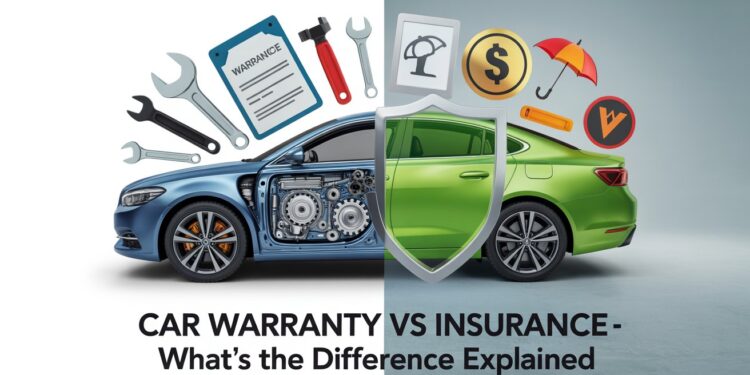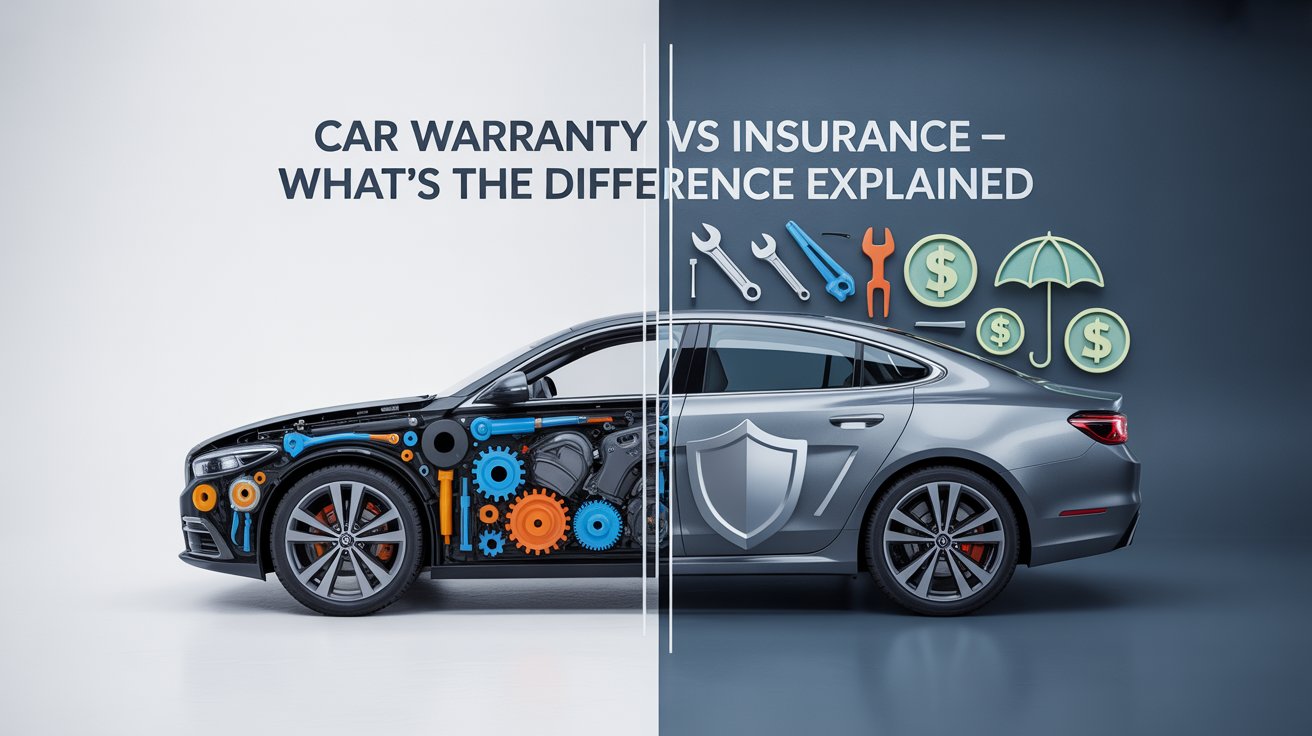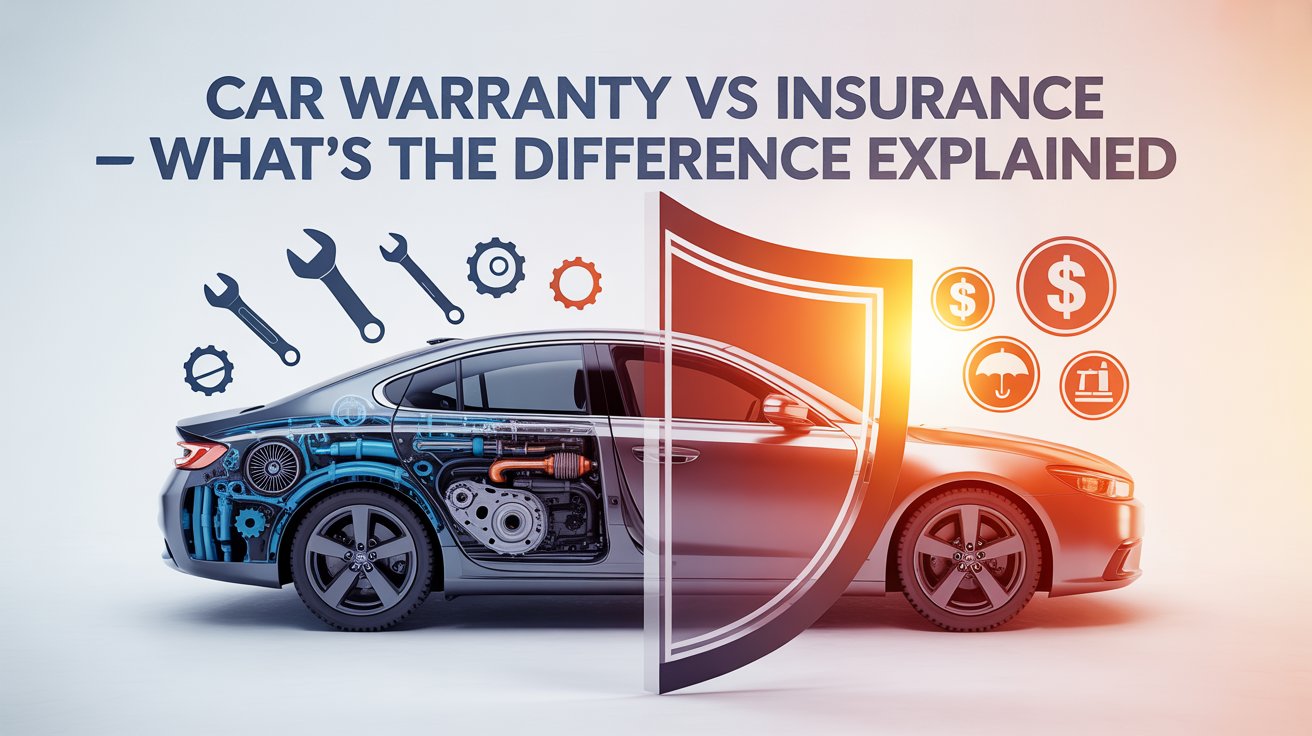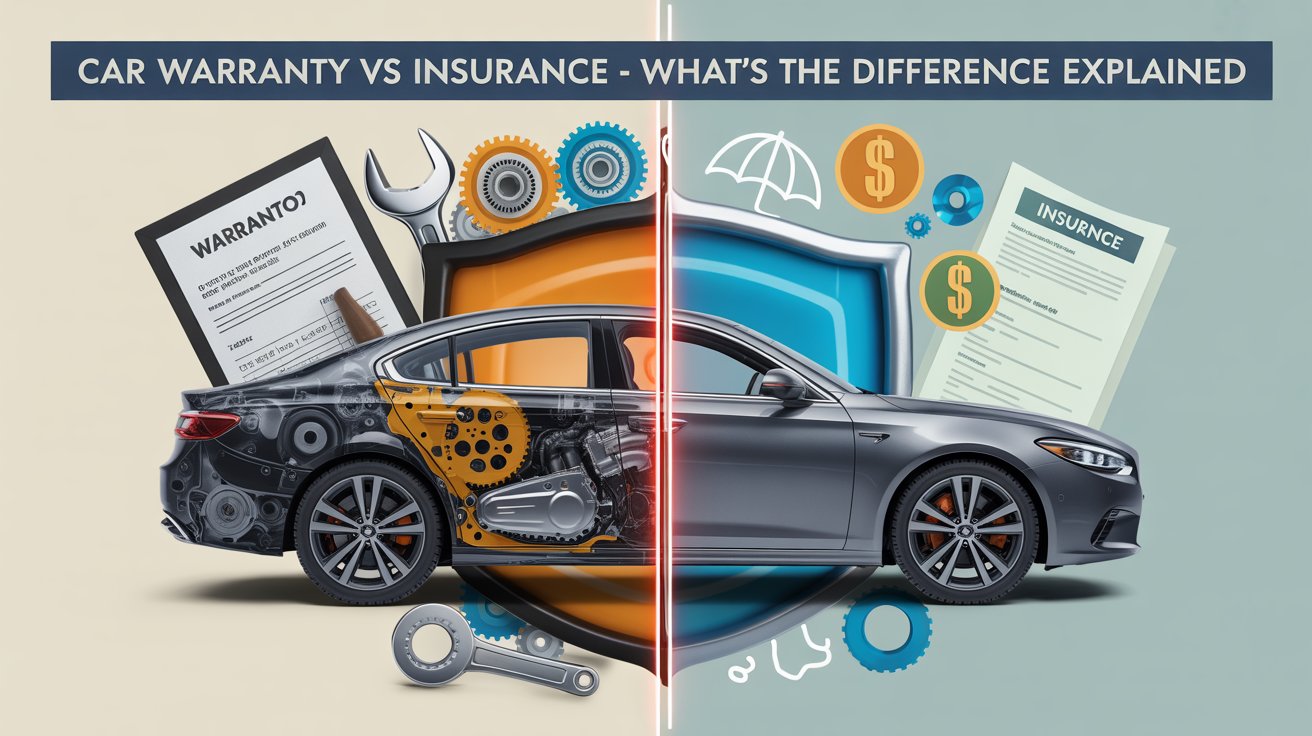When buying or owning a vehicle, two types of protection are often discussed: car warranties and car insurance. At first glance, they may sound like interchangeable safety nets. After all, both are meant to protect car owners from costly bills. But they serve completely different purposes and are not substitutes for each other.
This confusion is common. Many new car buyers assume their warranty covers accidents. Others believe their insurance policy will pay for mechanical breakdowns. Unfortunately, these assumptions often lead to unexpected out-of-pocket expenses.
So, Car Warranty vs Insurance – What’s the Difference? The short answer is:
-
A warranty covers specific parts of your car if they fail due to defects.
-
Insurance covers your car when it’s damaged by accidents, theft, or other outside events.
This article dives deep into how warranties and insurance differ, how they complement each other, and how to decide which coverage best fits your situation. We’ll also discuss extended options, real-world examples, cost breakdowns, and common myths so you can drive with confidence and clarity.
What Is a Car Warranty?
A car warranty is essentially a manufacturer’s or dealer’s promise. If certain parts of your vehicle break down within a specific time or mileage, they’ll fix or replace them at no additional cost to you.
Think of it as a safety guarantee against unexpected mechanical problems caused by poor workmanship or defective parts.
Key Features of Car Warranties
-
Coverage: Major systems such as engine, transmission, suspension, and electronics.
-
Exclusions: Normal wear-and-tear (tires, brake pads, wipers, oil changes) and damage from accidents or misuse.
-
Duration: Often 3 years/36,000 miles, but premium brands may extend coverage (e.g., Hyundai’s 10-year/100,000-mile powertrain warranty).
-
Cost: Included in new vehicle purchase; extended warranties cost extra.
-
Providers: Automakers, dealerships, or third-party warranty companies.
Types of Car Warranties
-
Bumper-to-Bumper Warranty – Covers nearly everything between the front and back bumpers, except consumables like tires and brakes.
-
Powertrain Warranty – Protects critical parts such as the engine, transmission, and drivetrain.
-
Corrosion/Rust Warranty – Specifically covers rust damage, often lasting longer than other warranties.
-
Extended Warranty (Vehicle Service Contract) – Purchased separately to extend coverage after the original warranty ends.
Real-World Example of a Warranty in Action
Imagine your car’s transmission suddenly fails at 25,000 miles. With a powertrain warranty in place, the manufacturer covers the full repair—saving you a potential $3,500–$5,000 bill. Without it, you’d be responsible for the entire cost.
What Is Car Insurance?
Car insurance is a legally required contract between you and an insurer. You pay regular premiums, and in exchange, the insurance company helps cover expenses if your car is damaged, stolen, or you cause harm to others.
Unlike a warranty, insurance doesn’t cover parts that simply wear out. Instead, it protects you from unexpected external events that could cause financial ruin.
Key Features of Car Insurance
-
Coverage: Accidents, theft, vandalism, weather damage, liability for injuries, and property damage.
-
Exclusions: Mechanical breakdowns or maintenance issues.
-
Timeframe: Active as long as premiums are paid.
-
Cost: Depends on driving history, car type, age, coverage level, and location.
-
Providers: Licensed insurance companies regulated by state law.
Types of Car Insurance
-
Liability Insurance – Covers injury or property damage to others if you’re at fault.
-
Collision Coverage – Pays for repairs to your car after an accident.
-
Comprehensive Coverage – Covers theft, vandalism, and natural disasters.
-
Uninsured/Underinsured Motorist Coverage – Protects you if hit by someone with insufficient coverage.
-
Medical Payments/PIP – Helps with medical expenses after an accident.
Real-World Example of Insurance in Action
Suppose you rear-end another driver, damaging both cars. Insurance steps in:
-
Your liability insurance pays for the other driver’s repairs and medical bills.
-
Your collision coverage pays for your own car’s repairs.
Without insurance, you’d face potentially tens of thousands of dollars in costs—and legal penalties for driving uninsured.
Car Warranty vs Insurance – What’s the Difference?
Now that we understand the basics, let’s directly compare the two.
Aspect |
Car Warranty |
Car Insurance |
|---|---|---|
Purpose |
Covers mechanical/electrical failures due to defects |
Covers accidents, theft, and external damage |
Coverage Scope |
Specific systems: engine, transmission, electronics |
Collision, liability, weather, theft, vandalism |
Required by Law? |
No |
Yes, in most states |
Provider |
Manufacturer, dealer, third-party warranty firm |
Insurance company |
Duration |
Fixed (e.g., 3 yrs/36,000 miles) |
Continuous, as long as premiums are paid |
Cost Structure |
Built into car or purchased as add-on |
Ongoing monthly/annual premiums |
Claims Process |
Repairs at approved facilities |
Insurance adjuster reviews and approves claims |
Main Benefit |
Peace of mind against defects |
Legal compliance + financial protection from external events |
Why You Need Both
Relying on only one form of protection leaves dangerous gaps:
-
Insurance only: You’re covered for accidents but must pay for mechanical failures.
-
Warranty only: You’re covered for defects but not for accidents, theft, or liability.
-
Both: Comprehensive protection—your car and your finances are safeguarded.
Scenario Comparison
-
Engine breakdown at 20,000 miles: Warranty covers it; insurance does not.
-
Rear-end accident at 40,000 miles: Insurance covers repairs; warranty does not.
-
Car stolen at 18 months old: Insurance covers replacement; warranty is irrelevant.
-
Air conditioning fails at 10,000 miles: Warranty covers repair; insurance does not.
Extended Warranties vs Mechanical Breakdown Insurance
When your manufacturer’s warranty expires, you may face a gap. This is where extended coverage options come into play.
Extended Warranties
-
Sold by automakers, dealerships, or third parties.
-
Usually last several more years beyond the factory warranty.
-
May restrict you to specific service centers.
-
Higher upfront or financed costs.
Mechanical Breakdown Insurance (MBI)
-
Offered by some insurers as an add-on policy.
-
Works similarly to warranties but billed monthly like insurance.
-
Often allows repair at a wider range of shops.
-
Can be canceled if no longer needed.
Which Should You Choose?
-
Extended Warranty: Better for buyers who prefer working directly with the manufacturer or dealership.
-
MBI: Better for flexibility, especially if you like using independent repair shops.
Cost-Benefit Analysis
Warranty Costs
-
Included in purchase price for new cars.
-
Extended warranties: $1,500–$3,000 upfront (varies by plan and vehicle).
Insurance Costs
-
Average U.S. insurance premium: about $1,700 annually.
-
High-risk drivers may pay double or more.
Repair Costs Without Coverage
-
Transmission replacement: $3,000–$5,000.
-
Engine rebuild: $4,000–$7,000.
-
Air conditioning repair: $1,000+.
Having both warranty and insurance ensures you avoid financial shocks that could drain your savings.
Legal Protections You Should Know
-
Magnuson–Moss Warranty Act: Ensures manufacturers provide clear, written warranty terms.
-
State Lemon Laws: Protects consumers when cars have recurring, unfixable issues under warranty.
-
Insurance Regulations: States set minimum required insurance levels (usually liability).
Understanding these laws helps you know your rights if disputes arise.
Common Misconceptions
-
“Insurance covers everything, even breakdowns.” False—insurance won’t cover mechanical failure unless you add MBI.
-
“A warranty is required by law.” False—only insurance is legally mandated.
-
“Extended warranties always save money.” Not always—sometimes repair costs never exceed the warranty price.
-
“Warranty repairs are always free.” False—some warranties have deductibles or partial coverage.
Buyer’s Checklist: Choosing the Right Coverage
-
Check your manufacturer’s warranty before buying extras.
-
Review your insurance policy to see what’s included or excluded.
-
Compare costs of extended warranty vs MBI based on your car’s reliability.
-
Factor in driving habits—long commutes or heavy usage may increase repair likelihood.
-
Research provider reputation—read reviews and check BBB ratings for third-party warranty companies.
FAQs
1. Can I drive without car insurance if I have a warranty?
No, insurance is legally required; a warranty cannot replace it.2. Does a warranty cover accidents?
No, warranties only cover defects and mechanical failures.3. Can I buy a warranty for a used car?
Yes, but terms may vary depending on age, mileage, and provider.4. What happens when my warranty expires?
You’ll pay for repairs unless you purchase extended coverage or MBI.5. Is mechanical breakdown insurance worth it?
It depends on your car’s reliability and how long you plan to keep it.6. Can insurance companies deny claims?
Yes, if the claim doesn’t meet policy terms or involves fraud.7. Do warranties cover wear-and-tear?
No, items like tires, brakes, and oil changes are excluded.8. Can I transfer my warranty to a new owner?
Often yes, but terms differ by manufacturer and warranty type.9. Does insurance cover rental cars during repairs?
Only if your policy includes rental reimbursement coverage.10. Is an extended warranty better than saving money in an emergency fund?
Depends—an emergency fund gives flexibility, but warranties provide guaranteed repair coverage.
Conclusion
So, Car Warranty vs Insurance – What’s the Difference? In simple terms:
-
A warranty covers your car’s internal failures and defects.
-
Insurance covers external events like accidents, theft, or natural disasters.
One is optional, the other is mandatory. Together, they provide the most complete protection for your car and finances.
Whether you’re a first-time buyer or a seasoned driver, understanding the difference ensures you won’t face costly surprises. The smartest approach? Carry the legally required insurance, and evaluate whether a warranty or MBI makes sense for your car’s age, mileage, and reliability.
Knowledge is your best protection—next time you hear about warranties or insurance, you’ll know exactly what they mean, how they differ, and why both matter.







